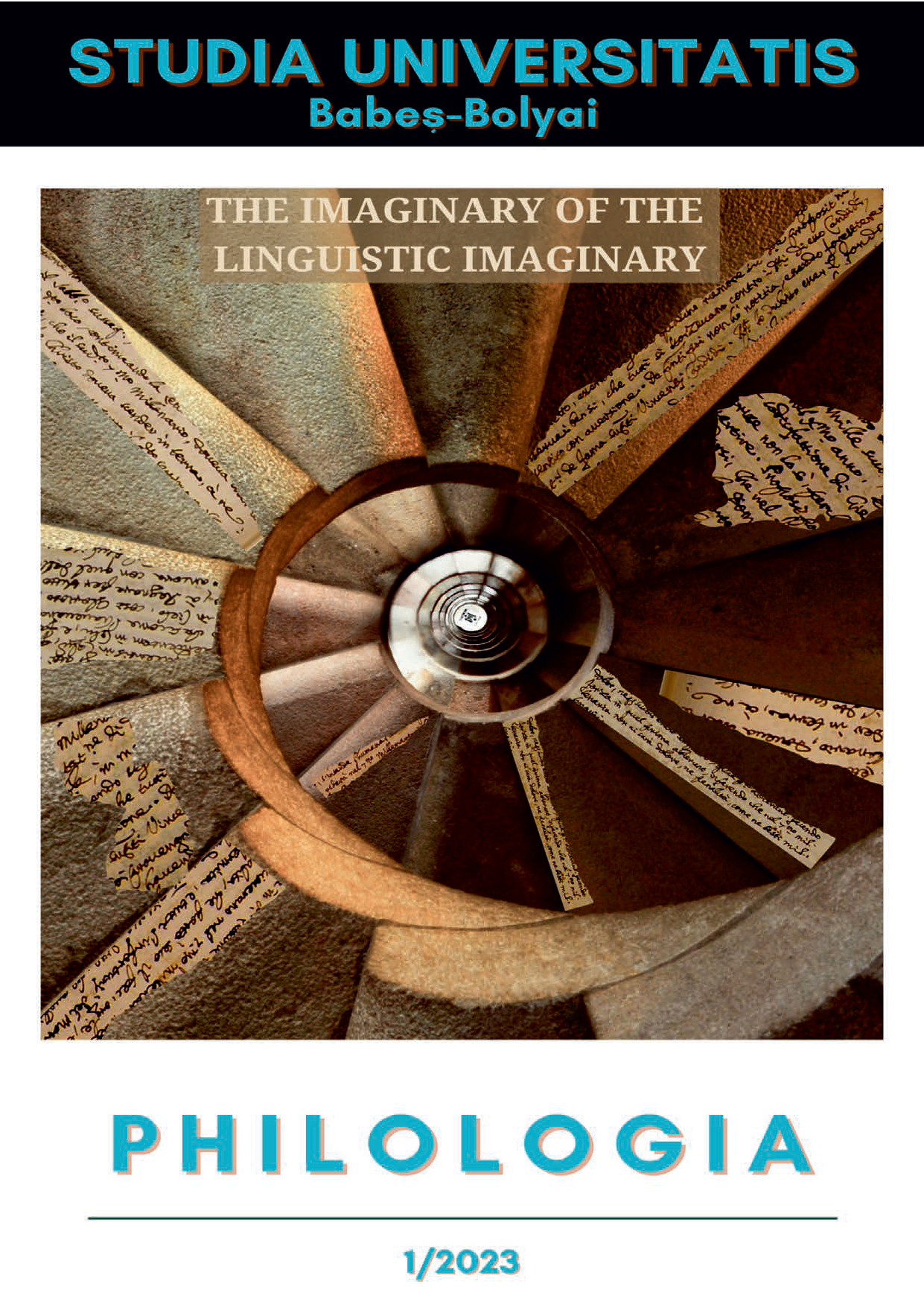THE COLLECTIVE IMAGINARY OF ROMGLISH IN CYBERSPACE AND FACE-TO-FACE INTERACTIONS
DOI:
https://doi.org/10.24193/subbphilo.2023.1.12Keywords:
collective imaginary, Romglish, Globish, cognitive processes, online and offline interactionsAbstract
The Collective Imaginary of Romglish in Cyberspace and Face-to-face Interactions. The activity of Romanian users in digital spaces oftentimes exhibits a dynamic code containing Romglish (the combination of Romanian and English features), which also reverberates in offline discourses and has an ongoing boomerang effect between offline and online interactions. By means of a survey, this paper investigates the Romanian collective imaginary which is set in the linguistic data. As the Romanian language constitutes a matrix in which English and Globish (a simplified pragmatic form of English) are embedded and they become part of a new dynamic code, destined to be changed at all levels (lexical, morphological, and syntactical), Romanian native speakers’ perception of Romglish is an important dimension. As such, this paper will analyse how individuals perceive their personal use of Romglish online and in face-to-face interactions: the use of the code created, the preferences and mechanisms of linguistic choices and linguistic creativity, the frequency of code-switching and code-mixing both in formal and informal contexts, and the degree of universality of the code used. The findings will provide insight not only specific to the aspects of the Romglish, but also related to the cognitive processes involved and the reasons which trigger such processes.
REZUMAT. Imaginarul colectiv al romglezei în spațiul digital și în interacțiunile față în față. Activitatea utilizatorilor români în spațiile digitale prezintă de multe ori un cod dinamic conținând romgleza (combinația dintre elemente de română și engleză), care reverberează și în discursurile offline și are un efect de bumerang între interacțiunea offline și cea online. Prin intermediul unui chestionar, această lucrare investighează imaginarul colectiv românesc care se reflectă în datele lingvistice. Întrucât limba română constituie o matrice în care engleza și globish (o versiune pragmatică simplificată a limbii engleze) sunt încorporate și devin parte a unui nou cod dinamic, menit să fie modificat la toate nivelurile (lexical, morfologic și sintactic), percepția vorbitorilor native de română asupra romglezei reprezintă o dimensiune importantă. Ca atare, această lucrare va analiza percepția nativilor cu privire la utilizarea romglezei în spațiul cibernetic și în interacțiunile față în față: utilizarea codului creat, preferințele și mecanismele de selecție a unor structuri, frecvența code-switching-ului și a code-mixing-ului atât în contexte formale, cât și informale, precum și gradul de universalitate al codului utilizat. Rezultatele vor oferi nu doar o perspectivă asupra aspectelor ce țin de romgleză, ci și asupra proceselor cognitive implicate și a motivelor care declanșează aceste procese de selecție.
Cuvinte-cheie: imaginar colectiv, romgleză, globish, procese cognitive, interacțiuni online și offline
Article history: Received 29 December 2022; Revised 8 February 2023; Accepted 27 February 2023; Available online 27 March 2023; Available print 31 March 2023.
References
Călăraşu, Cristina. 2003. “Globalizare lingvistică şi anglicizare.” Aspecte ale dinamicii limbii române actuale (II). edited by Gabriela Pană Dindelegan, Bucureşti: Editura Universităţii din Bucureşti, pp. 323-337.
Crystal, David. 1999. “Swimming with the tide in a sea of language change.” IATEFL Issues, 1-4, https://www.davidcrystal.com/Files/BooksAndArticles/-4873.pdf.
Crystal, David. 2005. “The scope of Internet linguistics.” Paper given online to the American Association for the Advancement of Science meeting. Available: https://www.davidcrystal.com/Files/BooksAndArticles/-4113.pdf.
Fauconnier, Gilles, Turner, Mark. 2002. The Way We Think. Conceptual Blending and the Mind’s Hidden Complexities, Basic Books.
Gibson T. & S.J. Murray. 2012. “Global Village,” Encyclopedia entry in Encyclopedia of Media and Communication, edited by M. Danesi, 312-313. University of Toronto Press, https://modernrhetoric.files.wordpress.com/2010/11/global-village.pdf.
Lytra, Vally. 2016. “Language and Ethnic Identity.” In The Routledge Handbook of Language and Identity, edited by Siân Preece, 131-145, London and New York: Routledge: Taylor and Francis Group.
Marinescu, Titus, Radu. 2012. “Romania in the Globalization Context.” Revista Română de Statistică, no IV: 87-93.
Nicolaescu, Ioana. 2015. “Conversații în romgleză. Cum se vorbește în multinaționale și cum afectează limba română.” Adevărul, February 4/2015 [Online]. Available: http://adevarul.ro/educatie/scoala/conversatiiromgleza-vorbeste-multinationale-afecteaza-limba-romana-1_54d22472448e03c0fd45e794/index.html
Radu, Anamaria. 2020. “Cyberlimb@j în spaţiul lingvistic românesc.” Enciclopedia imaginariilor din România II. Patrimoniu și imaginar lingvistic, 394-406. București: Polirom.
Radu, Anamaria, Cotoc, Alexandra. 2021. “RomGlobish – The Dynamic Code of Romanian YouTubers.” Journal of Romanian Literary Studies, no 24: 722-732.
Saxena, M. 2014. ““Critical diglossia” and “lifestyle diglossia”: linguistic diversity, national development.” International Journal of the Sociology of Language, no: 225: 91–112.
Stoichițoiu Ichim, Adriana. 2006. Aspecte ale influenţei engleze în româna actuală. Bucureşti. Editura Universităţii din Bucureşti.
Ungureanu, Elena. 2010a. “Limba noastră cea on‑line de toate zilele.” Akademos, no:1 (16): 68-73, http://www.akademos.asm.md/files/Limba%20noastra%20cea%20online%20de%20toate%20zilele.pdf.
Ungureanu, Elena. 2010b. “Text, e‑text, intertext şi internet.” Philologia, no: 1‑2: 86-90, http://www.diacronia.ro/ro/indexing/details/A6920/pdf.
Vișan, Ruxandra. 2016. “Linguists, Romglish and Verbal Hygiene.” Romanian Journal of English Studies, no 13: 137-144.
Zafiu, Rodica. 2001. Diversitate stilistică în româna actuală. Bucureşti: Editura Universităţii din Bucureşti.
Dictionaries
Cambridge Dictionary. Online version, https://dictionary.cambridge.org/grammar/british-grammar/discourse-markers-so-right-okay?q=discourse+markers.
Downloads
Published
How to Cite
Issue
Section
License
Copyright (c) 2023 Studia Universitatis Babeș-Bolyai Philologia

This work is licensed under a Creative Commons Attribution-NonCommercial-NoDerivatives 4.0 International License.





 ©Studia Universitatis Babeş-Bolyai Philologia. Published by Babeș-Bolyai University.
©Studia Universitatis Babeş-Bolyai Philologia. Published by Babeș-Bolyai University.